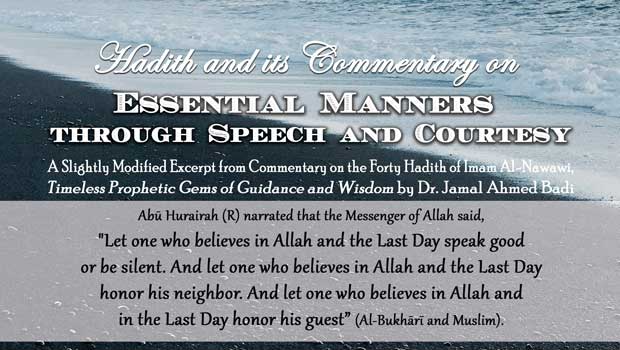An Excerpt from Commentary on the Forty Hadith of Imam Al-Nawawi
Timeless Prophetic Gems of Guidance and Wisdom
–
Abū Hurairah (R)narrated that the Messenger of Allah said, “Let one who believes in Allah and the Last Day speak good or be silent. And let one who believes in Allah and the Last Day honor his neighbor. And let one who believes in Allah and in the Last Day honor his guest” (Al-Bukhārī and Muslim).
Introduction
This ḥadīthcontains the rulings concerning the tongue and the behavior of Muslims towards others. It also emphasizes that we are responsible for whatever that we say. Al-Imām Haythamī points out that this ḥadīthis very similar in meaning to Hadith 13 which says: “None of you truly believes until he loves for his brother what he loves for himself.” He says that everyone is a neighbor to someone else. Therefore, if this ḥadīth is properly practiced and applied, there will be a stronger bond and love within society. However, one additional thing is that in this ḥadīth, neighbor can mean anyone, Muslim or non-Muslim. So, in this ḥadīth, good mannerisms are extended to a broader group of people including fellow non-Muslims who reside nearby.
Lessons
A. Guarding our Speech
The responsibility of the Muslim upon what he/she says is mentioned in the Quran in Surahs Quaff,āyah 18: “Not a word does he utter but there is a watcher by him ready to record it.” Furthermore, there are many hadiths which highlight the importance of our speech and utterances. The Prophet (pbuh)says:”A man utters a word pleasing to Allah without considering it of any significance for which Allah exalts his rank (in Jannah); another one speaks a word displeasing to Allah without considering it of any importance, and for this reason he will sink down into Hell”(Al-Buhari).
This shows that the words spoken can have a direct effect on us, whether we perceive it or not. The Prophet (pbuh) also narrates a story about one righteous person who fell into the Hellfire on account of just one statement: “There were two men among Banū Isrāīl, who were striving for the same goal. One of them would commit sin and the other would strive to do his best in the world. The man who exerted himself in worship continued to see the other in sin. He would say: ‘Refrain from it.’ One day he found him in sin and said to him: ‘Refrain from it.’ He said: ‘Leave me alone with my Lord.Have you been sent as a watchman over me?’ He said: ‘I swear by Allah, Allah will not forgive you, nor will he admit you to Paradise.’ Then their souls were taken back [by Allah], and they met together with the Lord of the worlds.He (SWT) said to this man who had striven hard in worship: ‘Had you knowledge about Me or had you power over that which I had in My hand?’ He said to the man who sinned: ‘Go and enter Paradise by My mercy.’ He said about the other: ‘Take him to Hell.’” Abū Hurairah said: “By Him in Whose hand my soul is, he spoke a word by which this world and the next world of his were destroyed” (Sunan Abu Dawud).
B. Types of Good Speech
There are many ways in which we can say good things. The best of these are the following: dhikrullah (remembrance of Allah), recitation of the Qurʹān, duʼāʹ, and naṣīḥah. These are all things that are pleasing to Allah. Furthermore, there are many sunan and ʼibādāt which assist us in saying that which is good and restrain us from uttering evil. Whenever we speak to another person, regardless of whether they are strangers, friends, relatives, or neighbors, we should use the best words and terms.
Even when we do not intend to say something inherently bad, we should be careful with our tongues. Talk which has little or no benefit should be avoided. We need to realize that others may interpret our speech as negative from our body language, misinterpretation, or their viewpoint. Additionally, we should speak in a manner that is simple and easy to comprehend. Failing to choose the appropriate words and/or mannerisms may lead to a misinterpretation and end up with a conflict. On the other hand, as a listener, we have to interpret what is said in a positive and good way. We should not over-interpret what we hear or read between the lines. By paying attention to this, we minimize disputes and conflicts from our end. Furthermore, this helps in elevating our character by avoiding suspicion, bias, and negativity.
If we are being consulted by someone and sought after for advice, we should try our best to give good advice. The advice given should assist and not exacerbate the problem or situation. If we do not have a sufficient amount of knowledge or are unable to provide the proper advice, then it is preferable that we exercise silence. We should also try to practice mu’āsah, to say good things of encouragement to those who are in low spirits. Whenever we meet people who are sick, sad, depressed or in a bad frame of mind, we should always say things that can make them feel better. Specifically, reminding them to have patience in facing their calamity and encouraging them to be positive and strong.
If we find ourselves in the middle of a dispute between two people, such as between relatives or friends, we should not take sides. We should always try to assist them in reconciling their differences and in ending the dispute. In these types of circumstances or when giving naṣīḥah, we should ensure that confidentiality is maintained to minimize other problems from occurring.
C. Keeping Silent: Restraining the Tongue
It is essential that we restrain the tongue from the major evils before focusing on the smaller evils and ills. We, at all costs, have to refrain ourselves from saying that which is bad or untrue (i.e., a lie). Similarly, we must always verify any news that comes to us before disseminating it or adopting as true. This would prevent us from spreading lies and rumors. Additionally, it is essential for us to refrain from the major sins of the tongue such as slandering and backbiting. It is also a sin to make fun of others. Sarcasm and making fun of others is also to be avoided as it is a common social ill of today.
The act of complaining on simple matters may lead us to the act of impatience. This may affect our attitude and our actions. Should we wish to lament, we should direct it towards Allah alone. Such an act is known as munājah, which is a form of ʼibādah. Complaining to others besides Allah(SWT)is known as tashakkī which cancels out the ʼibādah from munājah and sab with respect to this ḥadīth. In restraining the tongue, ṣabr can also be defined as (1) to refrain oneself from panicking or being out of control, and (2) refraining one’s tongue from complaining. Thus, we should learn to minimize and ultimately eliminate the act of complaining.
Non-beneficial talk should be avoided to the best of our capacity. People can talk and chat for hours but a lot of what is said often has no value and is devoid of benefit, both for the talker and listener. In fact, such conversations can lead us into an area where we can say something displeasing to Allah(SWT). Furthermore, in Ḥadīth 29, the Prophet (pbuh) gave Muʼādh (R) a very important piece of advice in his question about the thing that will take him to Paradise and keep him away from Hell-fire: “…And shall I not tell you of the controlling of all that?” I said: “Yes, O Messenger of Allah.” So, he took hold of his tongue and said: “Restrain this.” I said: “O Prophet of Allah, will we be held accountable for what we say?” He said: “May your mother be bereft of you! Is there anything that topples people on their faces [or he said, on their noses] into the Hell-fire other than the jests of their tongues?”
At times we may encounter a situation that involves a fitnah or trial. In these sensitive circumstances, we have to be more careful of what we say. People can easily panic, get hopeless, and believe things which are not true. Some people may take advantage of the situation and say things which can worsen it. That is why we must be careful of what we say as it may increase the public’s fear and anxiety. Rather, we should use words that are positive and hopeful, to uplift the spirit of those facing the tribulation or problem.
D. Courtesy to the Neighbor
The second part of this ḥadīth stresses courtesy and generosity to our neighbors and guests. This is mentioned in Sūrah Nisāʹ, āyah 36: “…do good to parents, relatives, orphans, the poor, the neighbor who is near of kin, the neighbor who is a stranger, the companion by your side, the wayfarer [you meet], and those [slaves] whom your right hand possesses.”In a ḥadīth, the Prophet (pbuh) said:”Jibrīl(AS) kept advising me concerning the neighbor to the point that I thought that he would inherit from his neighbor” (Sahih al-Bukhari; also narrated in Muslim).
Another ḥadīth records the Prophet (pbuh) emphatically stating that one does not have complete īmān if his neighbor is not safe from his affairs. He (pbuh) said: “By Allah, he does not believe! By Allah, he does not believe! By Allah, he does not believe!” It was said, “Who is that, O Allah’s Messenger?” He (pbuh) said, “That person whose neighbor does not feel safe from his evil” (Sahih al-Bukhari). In another ḥadīth, the Messenger of Allah states: “When you make some soup, make a good amount by adding plenty of liquid, and give some to your neighbors”(Ṣaḥīḥ Muslim). This sharing of food between neighbors strengthens the relationship between them. We should be nice to our neighbors and share our food with them, whether Muslim or non-Muslim. We should be patient with our neighbor even if he annoys us. In another ḥadīth, the Prophet (pbuh) mentioned one of three types of people beloved to Allah(SWT): “A man who has a bad neighbor who annoys and disturbs him, but he bears it with patience and forbearance until Allah ends the matter either during his lifetime or upon the death of either of them” (Musnad Aḥmad, ṣaḥīḥ as per Al-Sheikhal-Albānī). This shows the importance of keeping good relations with neighbors even if they are a source of annoyance or harm.
E. Courtesy to the Guest
The guest mentioned in the last part of the ḥadīth is generally interpreted as “a travelling visitor who has come to stay for a short while.” In another ḥadīth, the Prophet (pbuh) says: “Whoever believes in Allah and the Last Day should be generous to his guest. His special gift [to the guest] is one day and night. He [the guest] is to be entertained for three days. Whatever is beyond that is an act of ṣadaqah. It is not lawful for a guest to stay with his host to the extent that he makes things difficult for him [the host]”(Ṣaḥīḥ al-Bukhārī).
Regarding this ruling extrapolated from this ḥadīth, the majority of scholars are of the opinion that hosting is not wājib. Even though it is a great and noble act, it is considered mustaḥabb or a recommended act. According to many scholars, the recommended act of hosting does not extend to evildoers or heretics. This is because there is potential for harm for the host and his household. However, some contemporary scholars are of the view that we should host even those who are sinners. This is due to the likelihood that by hosting them and being good to them, we might influence them to change and become better people. Hosting sinners would be following a general principle of fiqh that allows us to tolerate a minor harm in order to attain a major benefit (e.g. daʼwah, naṣīḥah). Nonetheless, we should be very cautious when hosting such people; we should only do so if we know that no harm may be inflicted upon us or our household.
Conclusion
This ḥadīth teaches us the proper manners with regards to speech and the honoring of our neighbors and guests. Speech is a common cause of discord and division within society and at the individual level. Again, the Prophet (pbuh) summarizes a great and important principle with a few words. The second part of the ḥadīth emphasizes the best of mannerisms to our neighbors and guests. Compared to Ḥadīth 14 [about the sacredness of life, chastity, and fidelity – Ed.], good treatments obliged on a broader group, which may include [toward] those who are not Muslim. Following this sacred advice leads to elevation of the society in its mannerisms and etiquette, and exemplifies the uniqueness of Islāmic values. These behaviors are actually very important in contemporary society where there is widespread deterioration of values and manners within the Muslim world. Altogether, this advice given by the Prophet (pbuh) leads to a more peaceful and harmonious Islāmic society in this life, while attaining the pleasure of Allah in the Hereafter.





